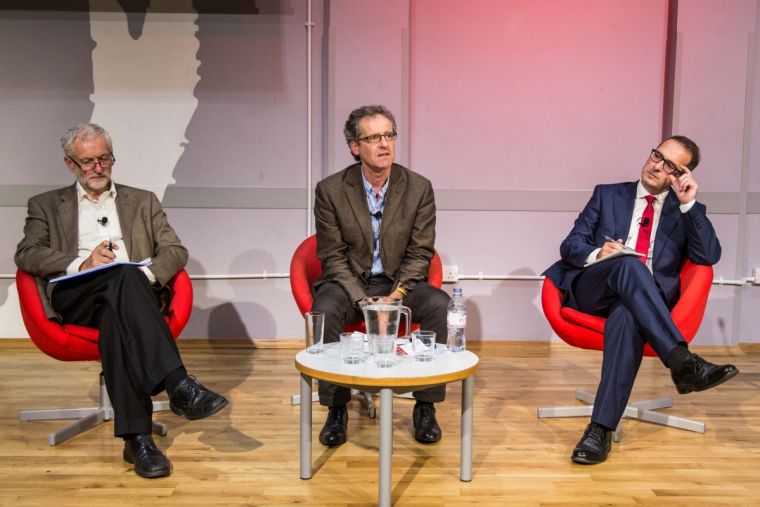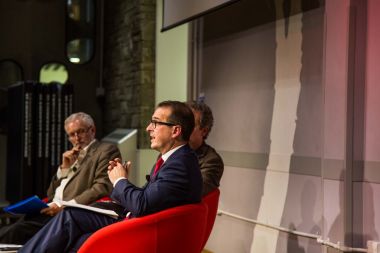
ktgphotography.com – Jeremy Corbyn, Tim Livesey and Owen Smith at Oasis Church.
With around a week left of the Labour Party leadership contest the battle lines are well drawn. The current leader Jeremy Corbyn remains popular with large numbers of new party members. Owen Smith, the Welsh MP challenging him to become the leader of Her Majesty’s Opposition, has the support of the majority of Members of Parliament.
Neither of the men has spoken in any detail about faith during the campaign. Given that the Labour Party was founded by evangelicals, non-conformists, Anglicans, Catholics and the Jewish community amid with socialist, Fabian and Trade Union groups over a century ago, it was appropriate that the two men finally got round to debating in front of an audience mainly comprised Christians and other people of faith.
Corbyn and Smith used the occasion to speak about the Christian heritage of the Labour Party, though neither of them is a believer.
The debate, organised by the Good Faith Partnership in association with Christians on the Left, The Jewish Labour Movement and Sikhs For Labour, took place at Oasis – the church in South London where Baptist minister and social activist Steve Chalke is the pastor.
Corbyn and Smith traded blows, chaired by Tim Livesey – former Chief of Staff to the Archbishop of Canterbury and Labour Leader Ed Miliband. The capacity audience (and those in an overflow venue) were far better behaved than at previous hustings with no booing and a high level of respect for both candidates.
Corbyn began his remarks by speaking about the role of faith groups in providing charitable services such as food banks. He also addressed the rise in racism in post-Brexit UK – although seemed to lay the blame for it at the feet of the British press. He also addressed the refugee crisis suggesting “humanity and political solutions” were the answer. He received the largest response of the evening when committing to extending council housing.
Corbyn acknowledged the foundational role of the Church in the Labour Movement. “Christian and Jewish groups were involved in the party at the very beginning… the role of the churches, synagogues and other places of worship were incredibly significant,” he said. Moving on to the present day, Corbyn lauded the work of churches and other faith groups in operating food banks and other vital community services.
“Our party has to have a strong and effective relationship with all faith communities – it cannot just be photo opportunities,” he carried on. “It has to be a more serious engagement than that… I commit myself to doing that.”
Moving on to address areas where faith groups have disagreed with some of Labour’s politics in the last few decades Corbyn said, “Gay rights, abortion, the Satanic Verses and other issues like that… those conversations must take place. [We must allow] everyone’s right to follow the faith of their choice… and [ensure] our young people to grow up and understand the basic tenets of all faiths.”
The north London MP also addressed the issue of anti-semitism which has dogged his leadership. “[I am] obviously more than alarmed at allegations of anti-semitism,” he said, before outlining the measures taken to address the problem. After hearing Smith promise a further review of the issue in the Labour Party, Corbyn said, “I am shocked at the idea that there would be anti-semitism. But it’s very obvious there have been some incidents… We cannot abuse people on the basis of their faith… we recognise the right of the Jewish community to express itself.”
After these remarks, we heard more of Corbyn’s standard stump speech about investment in the economy and tackling inequality. These remarks and most of his answers remained general and there were no new policy suggestions.
Smith also waxed lyrical about the links between faith and Labour. He told of how he’d opened three church-based food banks in his community since becoming an MP six years ago. He also highlighted the historic links between the Church and the Labour Movement – especially in his home patch of South Wales where Nonconformist churches were essential to the growth of the party.
“I’m not a person of faith,” he said, “but I have a deep understanding of the importance of faith… to our movement. Perhaps it’s because I’m Welsh… In south Wales we’ve a deep understanding of solidarity… mutualism… these are central to my politics and the faith of so many others.”

ktgphotography.com
Warming to his theme, Smith carried on, “We need to rely upon faith… we need a deeper understanding of how we can build a deeper connection in our communities.” Having heard opening remarks which highlighted the alienation many Christians and other people of faith feel in the Labour Party, Smith said, “Politics is still failing to understand faith properly… It’s particularly hurtful when it is the Labour Party.” Running short on time, Smith didn’t outline how he propose to bridge this divide, yet he came out with the soundbite of the night describing Parliament as, “the pulpit of this country” before again stressing the need for Labour to be in power.
He also highlighted the rise in racist incidents since Brexit, before the greatest hits of his own stump speech including the introduction of a wealth tax – and the theme of his whole campaign – that Labour needs to be in power to achieve anything.
The event took a different form to many of the debates so far in the campaign in that it wasn’t simply a straight discussion between the two candidates with a moderator.
Instead, a representative of each faith community had a chance to address the issues of concern to them. The Christian representative, Njoki Mahiaini, a member of Christians on the Left said, “Millions of Brits practise a faith… I love this party and have served it as a member and candidate.” She said, “My identity as a Labour member is built on a stronger identity as a Christian… From [RH] Tawney to [Keir] Hardie to Catholic Social Teaching, we must be loathe to unpick the Christian thread running through our party.” She also issued an appeal for party unity which was well received. “We must seek to remain a broad church… Faith communities can be amongst our closest allies as we take on whatever chaos or glory lies ahead.”
Rabbi Danny Rich representing the Jewish community carried on the theme saying, “Faith matters to a large number of people in the UK… It should matter to the Labour Party and be seen to matter… Religious beliefs & practices play an important role in the stability and co-operative nature of communities.”
Rich also addressed the issue of anti-Semitism – one of the main topics of the evening. “As a Labour member,” he said “I cannot tell you how much it grieves me when I hear Jewish members tell me how they’re feeling. Jews are not paranoid or manipulative. Their troubling experiences need to be heard at the highest levels of the Labour Party.”
Follow Andy Walton on Twitter @waltonandy


